Dear Friends,
“Wahat al-Salam,” an Arab-Jewish community, lies between Jerusalem and Tel Aviv. Its Hebrew name—“Neve Shalom”—means “Oasis of Peace.” Its inhabitants, comprising equal numbers of Arabs and Jews, are all citizens of Israel. They’re interested in exploring what it means to live, work, and study together in peace.
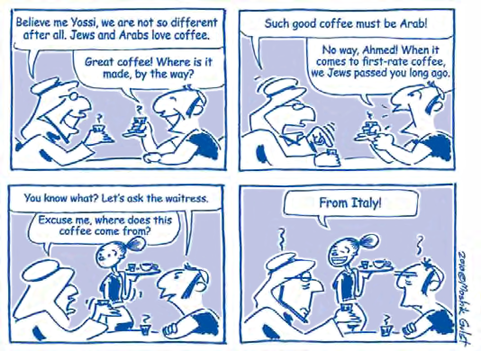
How’s that for a refreshing perspective?
The Oasis of Peace community centers on an educational system for children, 90% of whom come from surrounding areas. As the first joint Jewish-Arab educational system in the country, it assimilates its students into a social environment that places a premium on openness, tolerance, and mutual appreciation. Its vision statement upholds core values of mutual acceptance, respect, and cooperation, declaring:
One of the goals is to establish this form of education as a viable model for emulation [throughout the country]…believing that providing [Israeli] children with an educational environment that promotes understanding between the two peoples is an essential step on the road to a stable peace.
In addition to an educational program ranging from primary school to junior high, the Arab-Jewish community has established conflict resolution seminars. These seminars have brought in 45,000 young people, winning prestigious local and international awards.
Peace-making has been embraced for years in the Messianic Jewish community in Israel, where Arab pastors and Messianic Jewish leaders meet regularly and go off to prayer retreats annually. The brethren seem to have developed the mutual respect and cooperation that is so prized at the Oasis of Peace. With few exceptions in Arab-Muslim countries around Israel, Jews are pretty much hounded until they move out. And they are persecuted if they remain. Christians don’t fare particularly well, either. There is no shortage of articles to that effect, which appear regularly in the Levitt Letter.
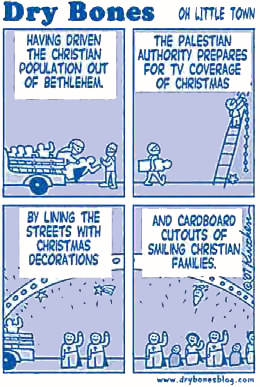
Neve Shalom was founded in the early 1970s on land leased from the adjacent Trappist Latrun Monastery. I was intrigued to learn about this experimental village. During visits to Israel, I’ll keep you posted on Neve Shalom and how it develops. You’ll also hear reports on hopeful signs from the Christian Arab and Messianic Jewish communities.
While leading the tours to Israel, I have been working on a new, prophecy-related television series on Esther called For Such a Time as This. I’m also finishing a two–year project—a book entitled Making Our Peace with the Warriors of the Sand. I touched upon the book’s subject during a speaking engagement at King of Kings Community in Jerusalem. This is the largest Messianic congregation in Israel—what Americans would call a megachurch. Our Spring Tour pilgrims accompanied me to this congregation and encountered sanctified Chosen People unique to Israel. I appreciate the traditional church buildings our tour groups visit. However, tourists should experience the “living stones” in Israel, as well—one of the “extras” you’ll treasure if you tour with us. The pilgrims were exhilarated by the exuberant Messianic Jewish praise they experienced at King of Kings Community Jerusalem.
On our way to Bethlehem, we stopped in at the Bethlehem Baptist Church. We listened to its Arab-Christian pastor Dr. Naim Khoury, in the so-called “Palestinian” city of Jesus’ birth, testify to his love for the Lord and for the Jewish people. He came to appreciate them through reading the Old Testament.
After Rosemary Schindler—niece to the Schindler of “Schindler’s List”—first told me about the pastor and church, our television producer, Ken Berg, arranged for me to interview him. You can see the interview by searching for “Khoury” at www.levitt.tv or you can meet him yourself if you venture to Bethlehem.
Readers of Making Our Peace with the Warriors of the Sand (available later this year) will become acquainted with another Middle Eastern friend—Ihab Griess of Egypt.
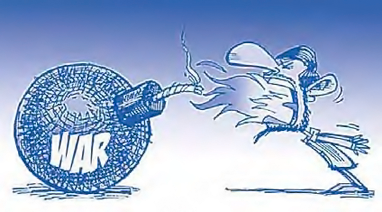
About a year ago, I submitted the manuscript’s first draft for critical review. One of the reviewers was an Egyptian Christian who had suffered discrimination at the hands of Islamic extremists. Ihab, a pharmacist, came to the States to study theology and ministry and subsequently became one of my students and parishioners. He eventually went to Regent University to take a master’s degree in Old Testament. He finished his studies with a Ph.D. from Southern Baptist Theological Seminary in Louisville, Kentucky. His doctoral dissertation was on the relationship between the Hebrew and Arabic languages.
I knew that Dr. Griess knew Arabic, Arabs, Islam, the Middle East, and the Bible. Christians like him suffer in Egypt to this day. So, I wondered how he would respond to my book, which examines the current Muslim-Christian-Jewish friction with aspirations to build some bridges. Fortunately, he liked the book and offered enough valuable enhancements to become co-author.
Warriors of the Sand—written by two followers of Christ, one Jewish and one Egyptian—complements two other books. The first—The Iranian Menace in Jewish History and Prophecy—gives a past and present perspective on how Jews looked at wars and rumors of Iranian wars. Guns and Moses explores how warfare to defend one’s hearth and home offends no authentic biblical religion. I wrote it fearing that Israel would eventually be forced to launch a pre-emptive strike at the belligerent regime that controls Iran. It made sense to publish a book in advance and in defense of any action Israel might take. Why not beat world opinion to the punch?
Meanwhile during May, Zola Levitt Presents is airing our popular The Warrior King: David-like Leadership for Goliath-like Times and Jehovah’s Treasure series. You can watch them on demand at www.levitt.tv. Why not spend an afternoon replaying favorite episodes or catching up on some you missed? If you click on “Store” at www.levitt.com, you’ll find a variety of short books that speak about God’s plans at time’s edge. It has been said “the long arm of the pen reaches beyond the grave,” because when a man writes, he continues to speak even after his vocal chords expire.
Zola Levitt spoke from a distinctly Jewish perspective about the world and the Word. Now this ministry that bears his name continues in his absence, offering new works as well as many classics. I’m blessed that Zola Levitt Ministries—still managed by Zola’s son Mark Levitt—entrusts me to carry on with the original vision and message. Thank you for making room in your heart as well, and for your contributions that enable our work.
“What exactly do you do now?” a periodic viewer recently asked me. After four years of teaching at this evangelistic ministry, I can honestly say that we do pretty much what we’ve always done:
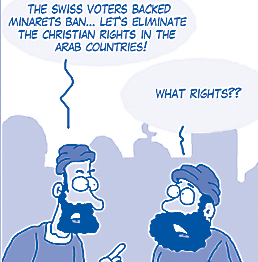 Of course, we could broadcast
Zola Levitt Presents exclusively on
Christian television stations. Doing
that would improve our chances of
finding sympathizers and financial
support. Instead, we incur millions
in additional expenses by airing
our program on secular networks
as well. We hope to sow seeds
for the Holy Spirit to water and
possibly cultivate future Believers
(and maybe supporters). It can be
a hard row to hoe.
Of course, we could broadcast
Zola Levitt Presents exclusively on
Christian television stations. Doing
that would improve our chances of
finding sympathizers and financial
support. Instead, we incur millions
in additional expenses by airing
our program on secular networks
as well. We hope to sow seeds
for the Holy Spirit to water and
possibly cultivate future Believers
(and maybe supporters). It can be
a hard row to hoe.
If standing on soapboxes and preaching on street corners would win hearts to the Gospel, I’d do it. Instead, this ministry’s guests and I speak through television screens in living rooms, and teleport our teaching to millions. Judging by the thousands of letters we get monthly—mostly positive—it is obvious that people are listening and learning, and we are truly making a difference.
Besides taking the case for Christ to the marketplace of public opinion via television, I have been teaching at colleges for twenty-one years. I retain three adjunct professorships in Bible institutes and seminaries. The pay is next to nothing, but the investment of training a new generation of Jewish-friendly pastors and missionaries will yield innumerable harvests.
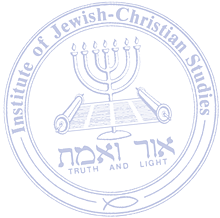 If you would like to sample college-level, Messianic Jewish
studies, you might enroll in a correspondence course I
developed with Zola. It’s called the Institute of Jewish-Christian
Studies, and it has twelve courses that each
take about a month to complete. As a student, you’ll
engage such subjects as:
If you would like to sample college-level, Messianic Jewish
studies, you might enroll in a correspondence course I
developed with Zola. It’s called the Institute of Jewish-Christian
Studies, and it has twelve courses that each
take about a month to complete. As a student, you’ll
engage such subjects as:
To read about it, visit store.levitt.com/institute or contact Jane in our office, who would be happy to send you our descriptive catalog.
Jesus once said: “I must work the works of Him who sent me while it is day; the night is coming when no one can work” ( John 9:4, NKJV). Though the world is changing—often for the worse—we have ample opportunities to advance Christ’s Kingdom. Let’s be about the Father’s business. Unable to do it alone, I ask who wants to assist me—do you? I am honored to stand on God’s promises with you, certain that He will bless you personally for standing with Israel (Gen. 12:3). As you remember His assurances to those committed to Him, please consider helping this ministry spread that Message in TV series like our new For Such a Time as This. Standing with the Jews is a surefire way to guarantee God’s blessings.
In the Book of Esther, pressures in Persia (Iran) forced a Jewish queen to risk her life in order to save her people. She said “If I perish, I perish!” (Esther 4:16). Of course, her courageous quest brought only more of God’s blessings for her and her people. A contribution to Zola Levitt Ministries won’t cause you to perish or even jeopardize your prosperity. However, it will put feet to a calling you cherish: ministry to the Jewish people. If you value that in your heart, please take a plowshare and help us sow across America and around the world.
 Given that a trip to Israel can be worth ten years
of Sunday School (as Zola used to say), you might
consider making that journey of a lifetime now.
Our summer tour, June 13–23, costs $500 less than
identical peak season tours. This fall, we offer four
options for you to see the Holy Land and walk where Jesus, Paul, and other
disciples walked. Depart October 12 to see Athens and Paul’s places of ministry
before joining other pilgrims in Israel (or begin travel with them from October
17). Return October 27, or stay until the 31st and visit Petra—the rose-rock city
in Jordan. Talk where Jesus talked. See what Jesus saw.
Given that a trip to Israel can be worth ten years
of Sunday School (as Zola used to say), you might
consider making that journey of a lifetime now.
Our summer tour, June 13–23, costs $500 less than
identical peak season tours. This fall, we offer four
options for you to see the Holy Land and walk where Jesus, Paul, and other
disciples walked. Depart October 12 to see Athens and Paul’s places of ministry
before joining other pilgrims in Israel (or begin travel with them from October
17). Return October 27, or stay until the 31st and visit Petra—the rose-rock city
in Jordan. Talk where Jesus talked. See what Jesus saw.
Do what Jesus did. At day’s end you’ll be greeted at the gates of Heaven by a voice that says: “Well done, good and faithful servant” (Matt. 25:21).
Your messenger,

Jeff
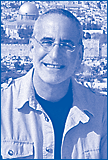
P.S. I expect the denigration of Israel to get much worse, making my clarion call through the brand new Esther television series even more urgent. We need Esthers to rise and stand for such a time as this!
Dear Jeff,
World opinion should embrace the ideals of the Oasis of Peace rather than condemning Israel’s self-defense.
“Here is my gift for May. ZLM must continue to educate Jews about Jesus, Christians about their Jewish roots, and unbelievers about both.”
The Warrior King tells the story of King David’s time; but it is also the story of our own time. With challenges larger than Goliath all around us, we need Bible-based leaders now more than ever. In this eight-part series, Dr. Jeffrey Seif speaks to that need. Dramatic re-enactments — shot on location in Israel — complement the teachings in this series.
From the eight-part TV series of the same title, this 86-page transcript of highlights includes dozens of photos and an abundance of Hebrew with translation. It can be used with the series or independently.
The Warrior King is a story about the Old Testament’s David — Israel’s greatest soldier. It’s also about the Bible’s “Son of David” — Jesus. The subtitle reveals that the story is both from all time and for all time. It’s about trials and triumphs, and how God uses abysmal circumstances to improve those who rely on Him.
Zola on Replacement Theology. What can replace Israel and the Jews in God’s plan? Certainly not America and not the Church. This book is a must read for many Believers, churches, seminaries, plus anyone else willing to celebrate the Promised Land and the Chosen People.